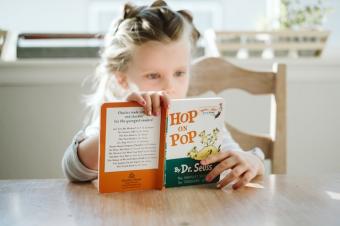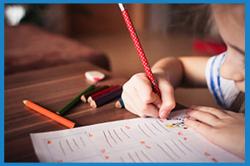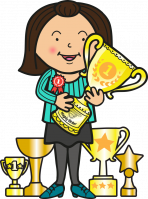Promoting Literacy in EYFS: Tips for Teachers & Parents
Promoting literacy in EYFS and Key Stage One is crucial for children's overall development and future success.
As Dr. Seuss once said,
"The more that you read, the more things you will know. The more that you learn, the more places you'll go."
Literacy opens doors, expands horizons, and empowers children to communicate, imagine, and explore the world around them.
Reading Aloud
 Reading aloud to children is a powerful way to foster their love for books and language. It exposes them to a wide range of vocabulary, develops their listening skills, and helps them make connections between spoken and written words. Whether you're a parent or a teacher, you can make the most of reading aloud by choosing age-appropriate books, using expressive voices, and engaging children in discussions about the story.
Reading aloud to children is a powerful way to foster their love for books and language. It exposes them to a wide range of vocabulary, develops their listening skills, and helps them make connections between spoken and written words. Whether you're a parent or a teacher, you can make the most of reading aloud by choosing age-appropriate books, using expressive voices, and engaging children in discussions about the story.
Creating a Print-Rich Environment
Surrounding KS1 children with print is essential for developing their literacy skills. Labelling objects, signs, and charts in the classroom or at home helps children associate written words with their meanings. Having a variety of books easily accessible and regularly rotated encourages children to explore and enjoy reading independently. Additionally, displaying children's artwork and writing creates a sense of pride and reinforces the importance of written expression.
Storytelling & Imaginative Play
 Storytelling and imaginative play provide opportunities for children to engage in language-rich activities. Encourage them to create their own stories, act out familiar tales, and use their imagination to explore different scenarios. By engaging in these activities, children develop their vocabulary, comprehension, and narrative skills while having fun.
Storytelling and imaginative play provide opportunities for children to engage in language-rich activities. Encourage them to create their own stories, act out familiar tales, and use their imagination to explore different scenarios. By engaging in these activities, children develop their vocabulary, comprehension, and narrative skills while having fun.
Multi-Sensory Activities
Learning letters can be made fun and engaging through multisensory activities. Sand trays, sensory bins, and finger painting allow KS1 children to explore letter formation and strengthen their fine motor skills. You can also use magnetic letters or foam letters to create interactive word-building exercises. These hands-on experiences help children develop letter recognition and phonemic awareness.
Writing Practice
 Providing children with opportunities to practice writing is essential for their literacy development. Encourage children to draw, scribble, and trace letters, even before they can write independently. This helps them become familiar with letter shapes and develop their fine motor skills. As children progress, provide them with writing prompts, such as creating their own stories or writing letters to family members or fictional characters.
Providing children with opportunities to practice writing is essential for their literacy development. Encourage children to draw, scribble, and trace letters, even before they can write independently. This helps them become familiar with letter shapes and develop their fine motor skills. As children progress, provide them with writing prompts, such as creating their own stories or writing letters to family members or fictional characters.
Involving Parents
Parental involvement plays a significant role in promoting literacy in EYFS. Parents can read aloud regularly to their children, create a print-rich home environment, and engage in storytelling and imaginative play. Additionally, parents can explore literacy resources, attend workshops, and share book recommendations with other parents. By working together, teachers and parents can create a strong foundation for literacy and inspire a lifelong love for reading and writing.
Collaboration & Professional Development in EYFS
Collaborating with other teachers and professionals is valuable for sharing ideas and best practices in promoting literacy. By exchanging experiences, resources, and strategies, educators can enhance their teaching approaches and better support children's literacy development. Ongoing professional development is also essential to stay updated on the latest research and teaching methods, ensuring that teachers have the knowledge and skills to effectively promote literacy in EYFS.
Celebrating Achievements
Celebrating and rewarding children's achievements in literacy fosters a positive attitude towards reading and writing. Recognise and acknowledge each child's progress, whether it's completing a book, mastering a new phonics skill, or writing their first sentence. Celebrations can take many forms, such as certificates, stickers, or a special reading corner in the classroom. By celebrating achievements, children feel motivated and encouraged to continue their literacy journey.
Individualisation & Assessment
Every child is unique, and it's essential to personalise literacy instruction to meet their individual needs and interests. Adapt activities and materials based on each child's abilities and provide support when necessary. Ongoing assessment and monitoring allow teachers to identify areas for improvement and tailor instruction accordingly. By understanding each child's strengths and challenges, teachers can create a stimulating and inclusive learning environment for literacy.
As James Earl Jones said,
"The ability to read, write, and communicate connects people and empowers them to achieve things they never thought possible."
Promoting literacy in EYFS is a collaborative effort between teachers, parents, and caregivers. By reading aloud, creating print-rich environments, engaging in storytelling and imaginative play, providing multisensory activities, and encouraging writing practice, we can nurture children's love for language and empower them to become confident readers and writers.
Looking for an engaging Literacy tool?
Transform Literacy almost overnight with Mighty Writer!
